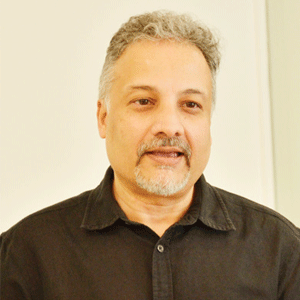
L. V. Prasad Film and Television Academy (LVPA): Connecting Theory Of Film Making & Learning To Real World Practice
By Santanu Chatterjee, Director of Academics
The universe of Indian cinema offers many different challenges and opportunities to aspiring filmmakers. Sri L.V. Prasad (producer, actor, director, cinematographer and recipient of Dadasaheb Phalke Award) dreamed of creating an exemplary film academy, as early as the 1950s, after achieving success in the Indian film industry. His son, Sri Ramesh Prasad, manifested L.V. Prasad's dream by establishing the L. V. Prasad Film and Television Academy (LVPA) in 2005. Since then, the Academy has graduated numerous filmmakers who have found success and fulfilment in the Indian film industry.
The faculty at LVPA are aware that they have to build upon the strengths of today's generation of students who are technologically savvy, who have the world's information at their fingertips. LVPA faculty are intentional about engaging students as active participants in the learning process, by helping them integrate, deepen, connect, and expand what they might already know. "By choosing to attend film school our students have decided to follow their passion instead of more conventional academic pursuits.
This choice, alone, ensures we get an extremely motivated cohort of students who are serious about their learning. While our students are talented, creative, and curious, they are also guided and taught by an equally gifted and passionate faculty who are always looking for innovative ways to marry professional experience and pedagogy. We discourage rote learning, mindless memorization, and passive learning at LVPA. Our focus is always on teaching the craft of filmmaking; however, we do not believe practice can be divorced from theory.
Our teachers connect theory to real-world practice, they invite students to question and discuss what they learn in class or in the field," states Santanu Chatterjee, Director of Academics, L. V. Prasad Film and Television Academy. LVPA is one of the few institutions of film education in India with a dedicated position responsible for the professional development of faculty. LVPA's student assessments are transparent, and all criteria are discussed with students beforehand, so that they have a clear understanding of how excellent academic performance is defined and evaluated.
Prasad Productions and Prasad Labs have a unique place in India's cinematic history. Sri Ramesh Prasad enjoyed a special relationship with many of India's greatest filmmakers and film technicians. LVPA students stand to inherit this tremendous legacy. The shared premises with Prasad's production and post-production studios offer LVPA students a unique film school experience; our students are encouraged to interact and network, in a structured manner, with various film technicians and creative artists who regularly visit our facilities.
Evolving digital technologies require continual research and frequent upgrades (in equipment and facilities); advised by industry professionals, our faculty keep abreast of these changes, and recommend adoption of new technologies, as and when needed. Students work with mirrorless as well as high-end digital cinema cameras, professional lenses, lights, post-production software, and sound recording and mixing equipment.
LVPA's teaching and learning environment is supported by edit suites, recording studios, shooting floor, library, and smart-classrooms. Leading manufacturers of equipment and software frequently visit LVPA to demo new technologies or discuss industry trends. Masterclasses, workshops, webinars and seminars by active filmmakers round out the film school experience for LVPA students, culminating in work-ready graduates, supported by a close-knit alum network eager to help new graduates find their professional feet in the industry.
Based Credit System (CBCS) prescribed by the University Grants Commission for higher education. The CBCS method of education provides flexibility in learning by letting students select from a list of core, elective and foundation courses within individual programs. In addition to content knowledge, students' analytical and creative skills are also assessed by an in-built evaluation system. LVPA focuses on faculty development throughout the year. We have a position dedicated to helping faculty become better teachers.
"We are constantly monitoring evolving trends and technologies in the industry. Our teachers continue to be serious students of cinema themselves. They participate in online fora, attend conferences, present papers, publish books, and make films. As new digital technologies evolve and emerge almost on a weekly basis, it is foolish to speculate where the industry will go ten years later. We are committed to educating ourselves continuously and making changes and adjustments whenever necessary," concludes Santanu Chatterjee.
Santanu Chatterjee, Director of Academics, LVPA is an award-winning filmmaker, with over 30 years of rich experience in Film Education. He has been associated with institutes including Minneapolis College, Minnesota, University of Malta and Syracuse University, New York.
A Pioneer in Teaching the Craft of Filmmaking
The faculty at LVPA are aware that they have to build upon the strengths of today's generation of students who are technologically savvy, who have the world's information at their fingertips. LVPA faculty are intentional about engaging students as active participants in the learning process, by helping them integrate, deepen, connect, and expand what they might already know. "By choosing to attend film school our students have decided to follow their passion instead of more conventional academic pursuits.
This choice, alone, ensures we get an extremely motivated cohort of students who are serious about their learning. While our students are talented, creative, and curious, they are also guided and taught by an equally gifted and passionate faculty who are always looking for innovative ways to marry professional experience and pedagogy. We discourage rote learning, mindless memorization, and passive learning at LVPA. Our focus is always on teaching the craft of filmmaking; however, we do not believe practice can be divorced from theory.
Our teachers connect theory to real-world practice, they invite students to question and discuss what they learn in class or in the field," states Santanu Chatterjee, Director of Academics, L. V. Prasad Film and Television Academy. LVPA is one of the few institutions of film education in India with a dedicated position responsible for the professional development of faculty. LVPA's student assessments are transparent, and all criteria are discussed with students beforehand, so that they have a clear understanding of how excellent academic performance is defined and evaluated.
Fostering A Busy and Working Environment
Prasad Productions and Prasad Labs have a unique place in India's cinematic history. Sri Ramesh Prasad enjoyed a special relationship with many of India's greatest filmmakers and film technicians. LVPA students stand to inherit this tremendous legacy. The shared premises with Prasad's production and post-production studios offer LVPA students a unique film school experience; our students are encouraged to interact and network, in a structured manner, with various film technicians and creative artists who regularly visit our facilities.
Evolving digital technologies require continual research and frequent upgrades (in equipment and facilities); advised by industry professionals, our faculty keep abreast of these changes, and recommend adoption of new technologies, as and when needed. Students work with mirrorless as well as high-end digital cinema cameras, professional lenses, lights, post-production software, and sound recording and mixing equipment.
LVPA's teaching and learning environment is supported by edit suites, recording studios, shooting floor, library, and smart-classrooms. Leading manufacturers of equipment and software frequently visit LVPA to demo new technologies or discuss industry trends. Masterclasses, workshops, webinars and seminars by active filmmakers round out the film school experience for LVPA students, culminating in work-ready graduates, supported by a close-knit alum network eager to help new graduates find their professional feet in the industry.
LVPA's (Chennai) programs of study follow the Choice
Based Credit System (CBCS) prescribed by the University Grants Commission for higher education. The CBCS method of education provides flexibility in learning by letting students select from a list of core, elective and foundation courses within individual programs. In addition to content knowledge, students' analytical and creative skills are also assessed by an in-built evaluation system. LVPA focuses on faculty development throughout the year. We have a position dedicated to helping faculty become better teachers.
"We are constantly monitoring evolving trends and technologies in the industry. Our teachers continue to be serious students of cinema themselves. They participate in online fora, attend conferences, present papers, publish books, and make films. As new digital technologies evolve and emerge almost on a weekly basis, it is foolish to speculate where the industry will go ten years later. We are committed to educating ourselves continuously and making changes and adjustments whenever necessary," concludes Santanu Chatterjee.
Santanu Chatterjee, Director of Academics, LVPA
Santanu Chatterjee, Director of Academics, LVPA is an award-winning filmmaker, with over 30 years of rich experience in Film Education. He has been associated with institutes including Minneapolis College, Minnesota, University of Malta and Syracuse University, New York.

